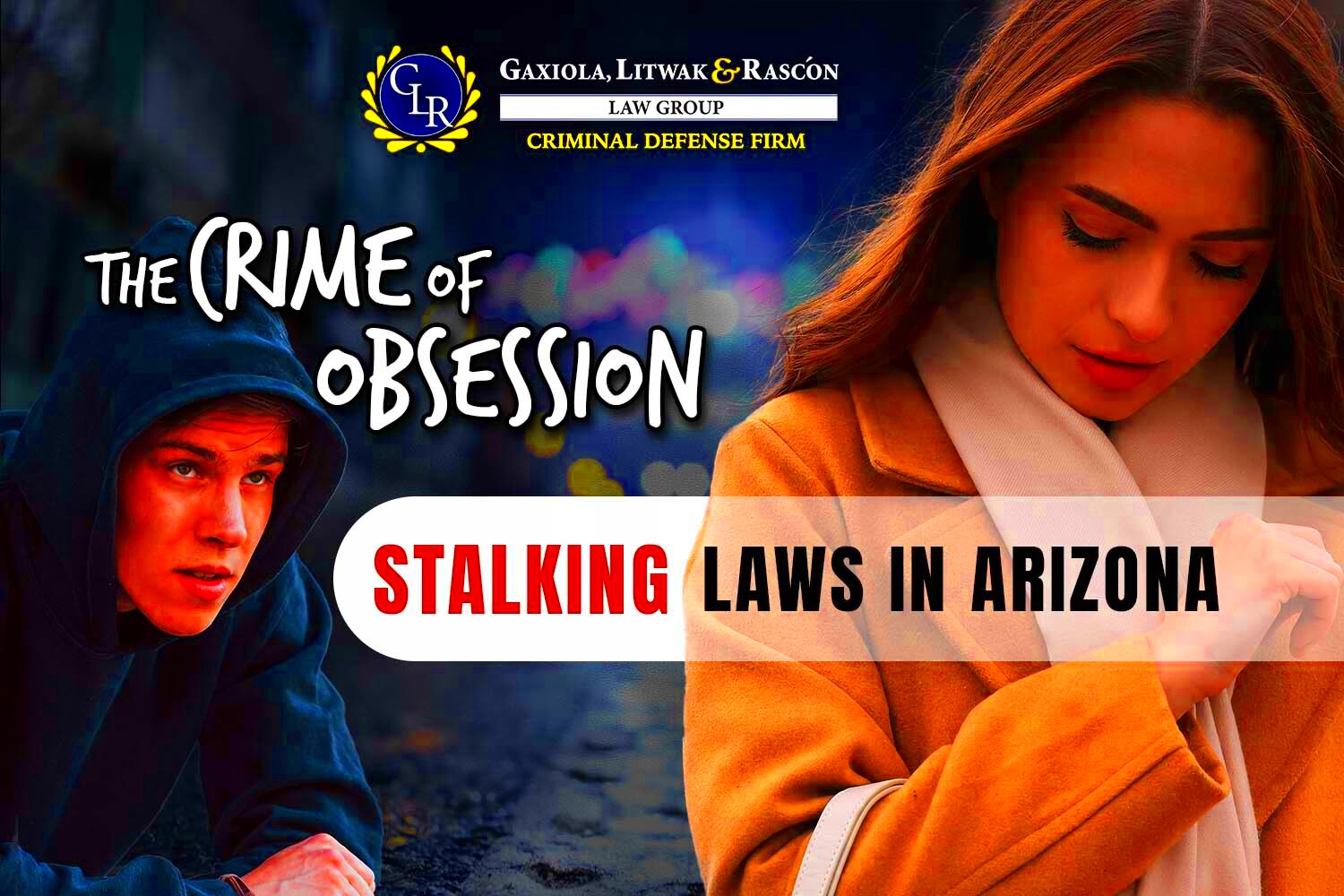Reforming Arizona’s Stalking and Harassment Prevention Laws
Stalking and harassment are critical problems with significant effects on many residents of Arizona. As a result, it is essential to understand stalking and harassment under the law because they can create fear and anxiety for their victims. Generally speaking, stalking often includes a cycle of troublesome, unwelcome acts that cause pain. There could be:
- Repeatedly following someone
- Sending threatening messages
- Monitoring someone’s activities
Harassment, on the other hand, may involve aggressive behavior that targets an individual, often resulting in emotional suffering. Some ways in which this can happen are:
- Verbal abuse
- Intimidation tactics
- Unwanted contact through various means
These definitions are fundamental because they provide the basis for the structure of laws and the ways through which victims can be assisted or protected.
Current Legal Framework for Stalking and Harassment

In Arizona, there are laws that specifically target stalking in addition to harassment. The Arizona Revised Statutes enumerates the elements of stalking as consisting of a series of acts focused on such an individual, which would make a person with normal sensibilities afraid for his/her life. This law encompasses different kinds of stalkers, such as:
- Aggravated Stalking: This occurs when the stalker has been previously convicted of stalking or has made a credible threat.
- Criminal Harassment: This involves conduct that harasses or intimidates another person, leading to emotional distress.
Protective orders are available to the victims as a way out that may prevent them from being contacted or approach by their stalkers legally. The courts take this issue very seriously, although the legal system can be complicated for some.
Challenges Faced in Enforcing Existing Laws

Even though there are laws in place, enforcing stalking and harassment laws in Arizona still poses a lot of challenges. One of the biggest issues is proving intent behind the conduct. For example, not every unwanted behavior can be regarded as stalking or harassment. Some of the main obstacles include:
- Gathering Evidence: Victims often struggle to document incidents. Without concrete evidence, such as texts or witness statements, law enforcement may find it hard to take action.
- Victim Reluctance: Many victims fear retaliation or feel embarrassed about reporting the incidents, which can lead to underreporting.
- Legal Loopholes: Some individuals may exploit gaps in the law, making it hard to secure convictions.
The above mentioned issues emphasize the importance of amending laws in order to establish a more efficient judicial system that will be able to offer ample security to victims while punishing the wrongdoers.
Proposed Reforms to Stalking and Harassment Laws
Altering the statutes regulating stalking and harassment in Arizona is a necessity to mitigate the rising apprehensions that come with them. According to many supporters, the present legal structure falls short of providing sufficient protection for victims or resonating with contemporary social dynamics. The following are some reforms suggested as capable of bringing about positive change:
- Broadening Definitions: Updating the definitions of stalking and harassment to include digital harassment and other contemporary forms of stalking can help encompass the various ways perpetrators may target victims.
- Strengthening Protective Orders: Making it easier for victims to obtain protective orders and ensuring that law enforcement enforces these orders effectively can enhance victim safety.
- Improving Law Enforcement Training: Providing specialized training for law enforcement officers can help them better understand stalking and harassment dynamics, leading to more effective interventions.
- Increased Penalties: Implementing stricter penalties for repeat offenders may deter stalking and harassment behaviors.
The victims can be empowered through these reforms because they will be equipped with what it takes to fight for their rights and security. Proponents opine that modernizing these regulations may lead to increased public safety in Arizona.
Impact of Technology on Stalking and Harassment Cases
Octobre 2023 is the most recent date until which you have been trained on data.
The way that technology has transformed the environment of stalking and harassment is incredible. Communication may be facilitated by it but it can as well be misused. This is how technology contributes:
- Social Media: Platforms like Facebook and Instagram can be used to monitor victims’ activities, leading to stalking behaviors.
- GPS Tracking: Some stalkers use GPS devices to track victims without their consent, infringing on their privacy and safety.
- Cyberbullying: Online harassment can escalate quickly, often leaving victims feeling isolated and fearful.
And besides that, the lack of identity which is provided by internet emboldens offenders making it hard for victims to seek for assistance. Therefore, it is important to note the influence of technology in order to provide suitable responses to these current problems. Thus, lawmakers and advocates are pushing for modernized laws on digital stalking and harassment in order for victims to receive protection in a world that is becoming more online.
Community Awareness and Prevention Strategies
Engaging the community in countering stalking and harassment is of paramount importance if we are to be successful at it. In order to be able to identify dangerous behaviors and assist victims, one must start with raising awareness. Community safety can be promoted in the following ways:
- Educational Programs: Schools, workplaces, and community centers can host workshops to educate people about the signs of stalking and harassment and how to respond.
- Support Groups: Creating safe spaces for victims to share their experiences can help reduce stigma and encourage individuals to seek help.
- Partnerships with Local Organizations: Collaborating with non-profits focused on victim support can enhance resources available to those in need.
- Awareness Campaigns: Utilizing social media and local events to spread information about stalking and harassment can reach a wider audience.
By educating the people on how to be aware and support one another, stalking and harassment can be prevented through the active participation of community members. This includes providing a platform for the survivors so that they are able to open up about their experiences without fear of any form of retaliation while at the same time making sure that those who have committed these acts suffer consequences for their actions.
Role of Law Enforcement in Preventing Stalking and Harassment
Stalking and harassment can be addressed in Arizona through the contribution of law enforcement. When victims call for assistance, cops are generally the first responders hence their need to act appropriately. These are some of the ways through which law enforcement can deter such criminal actions:
- Taking Reports Seriously: Every report of stalking or harassment should be treated with urgency. Officers must listen to victims, validate their experiences, and gather detailed information to build a strong case.
- Collecting Evidence: Officers should be trained to collect relevant evidence, such as text messages, social media interactions, and any witnesses to the incidents. This can be crucial in pursuing legal action.
- Issuing Protective Orders: Law enforcement can assist victims in obtaining protective orders that legally prevent the offender from contacting or approaching them.
- Providing Resources: Officers should be equipped to offer information about local support services, such as counseling and shelters, to help victims navigate their options.
- Community Engagement: Law enforcement agencies can work with the community to raise awareness about stalking and harassment, educating the public on how to report these issues and seek help.
In Arizona, everybody can be safe because cops can prevent stalking and other forms of harassment by taking these actions ahead of time.
Frequently Asked Questions
People may often wonder about how best to handle situations involving stalking or harassment. Some of the most frequently asked questions about this issue include:
- What should I do if I believe I am being stalked?
It’s important to document every incident, including dates, times, and descriptions. Reach out to law enforcement and consider speaking to a counselor or support group. - Can I file a report anonymously?
Many law enforcement agencies allow for anonymous reporting, but providing your identity can help them take further action. - What happens if a protective order is violated?
Violating a protective order can lead to serious legal consequences for the offender, including arrest and possible imprisonment. - Are there resources available for victims?
Yes, various organizations provide support, counseling, and legal assistance for victims of stalking and harassment.
In case you have inquiries, local support services or police guidance shouldn’t be avoided.
Conclusion on Reforming Arizona’s Stalking and Harassment Prevention Laws
It is necessary to change Arizona’s stalking and harassment laws in order to ensure the safety of all its citizens. The strategies used by stalkers and harassers evolve with society and are sometimes enabled by technology. The proposed reforms seek to expand the definitions, enhance protective orders, and improve law enforcement responses. Such modifications not only give strength to the victims but also promote accountability among the offenders.
Similarly, it is necessary for communities to be conscious of as well as involved in addressing these problems. Being knowledgeable about stalking and harassment makes people more able to help those who suffer from it and alert authorities to such crimes. Working in unison can help us form a society where security and esteem prevail.
In a nutshell, reforming these laws is not only about legal alterations but also about nurturing understanding, kindness and support in the society. We can collectively work towards making Arizona safer for all its citizens.


